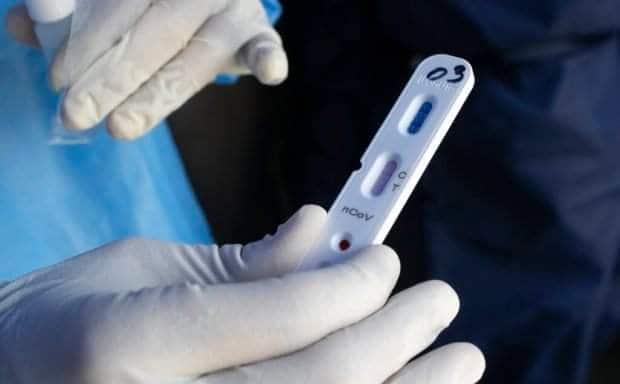
A doctor shows a negative quick coronavirus test in a tent set up at the entrance of a hospital in Caracas, Venezuela, Wednesday, April 15, 2020. Venezuela is going about testing its citizens unlike any other country: Mass deployment of a rapid blood antibody test from China that checks for proteins that develop a week or more after someone is infected, while using on a much smaller scale the gold-standard nasal swab exam that detects the virus from the onset. |AP Photo/Ariana Cubillos
CEBU CITY, Philippines — The highly urbanized cities of Cebu, Mandaue, and Lapu-Lapu are now faced with the challenge to balance economic sustainability and public health security as they take steps to determine the feasibility of shifting into modified enhanced community quarantine by the third week of May 2020.
The HUCs comprise about 80 percent of the total economy of Cebu with Cebu City being the center of trade, Mandaue City being a manufacturing hub, and the Lapu-Lapu City prevailing in export, travel, and hospitality industries.
These cities, however, were not spared from the economic burden brought by the coronavirus disease crisis and the subsequent ECQ that is now in effect in the entire province.
Watch: Launching of Project Balik Buhay in Cebu City, Mandaue City and Lapu-Lapu City
On Wednesday, April 29, the mayors of the three cities and officials of the Department of Health in Central Visayas (DOH-7) and the Office of the Presidential Assistant for the Visayas (OPAV) launched Project Balik Buhay which is geared to the reopening the three cities’ economy alongside responding to the pandemic crisis.
Among the initial steps that the tri-cities will take in determining the fate of the ECQ is a strategic mass testing that will target 10 percent of their total household population.
Read: Rapid testing in cities of Mandaue, Lapu-Lapu, and Cebu slated to start May 4
Councilor Raymond Garcia, who presented the plan for the mass testing in Cebu City, said the strategic testing in the barangays will start on Monday, May 4, and is targeted to be completed between May 15 to 20.
At the start of the testing, all of the 137 barangays in the three cities will be tagged as red zones or at-risk. However, barangays will be reclassified into orange or green zones depending on the assessment of health experts on the result of the strategic testing in the community.
“That would depend on how the testing results would come… I -analyze ni sa atong mga eksperto, maghatag og recommendation kung unsay angay nga buhaton diha sa maong community. Then, we can have conclusions kung unsa ang angay nga ablihan ug unsay dili angay ablihan (Experts will analyze the results and recommend to the community proper actions that should be undertaken based on the results. Then, we will come up with a conclusion to determine which communities should already be free of the restrictions.),” said DOH-7 Regional Director Jaime Bernadas.
Regional Development Council (RDC-7) Chair Kenneth Cobonpue, who represented the private sector, said that the priority companies will also be conducting their own rapid tests with their employees as a pre-requisite for returning to work.
The rapid testing cost for the employees will be shouldered by the companies.
Priority companies, which include those in the agri-industry, utilities, food production, construction and essential services, are projected to start their testing on May 14.
Presidential Assistant for the Visayas Michael Dino, for his part, said the rapid testing for employees who will be going to work will also be required even among government employees here.
A confirmatory test using polymerase chain reaction (PCR) machine will be conducted for those who will test positive in the rapid tests, including those who have been tested through their companies.
While strategic testing in communities and the rapid testing in companies are expected to be finished by May 20, the Project Balik-Buhay timeline projects that the three cities will proceed with the modified ECQ on May 21.
The priority businesses that have conducted rapid tests on their employees may also open starting May 21 based on the timeline. / dcb

